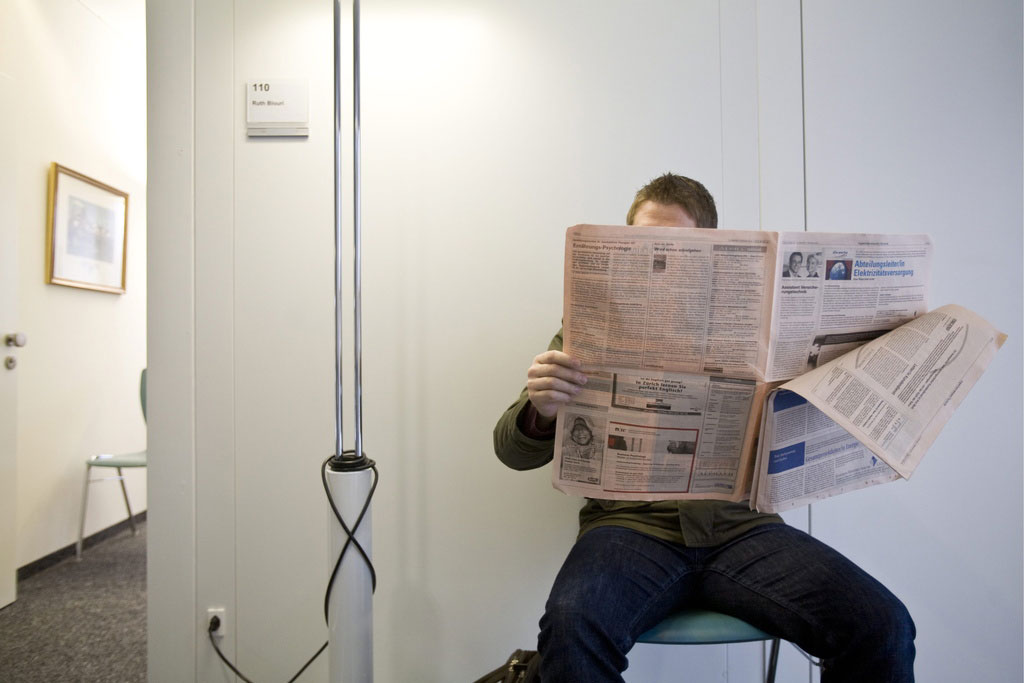
Jobless rise prompts fears but no panic

Switzerland has more to fear from unemployment in its export markets than the 12-year high jobless rate inside its own borders, according to one economist.
The number of people out of work rose by 8,790 in December to a total of 172,740 – an unemployment rate of 4.4 per cent not seen since 1998. However, this is less than half the Eurozone average of 9.8 per cent.
The latest jobless figures, released by the State Secretariat for Economic Affairs (Seco) on Friday, could make particularly uncomfortable reading for the Swiss retail sector. Seco believes the rate could peak at five per cent this year.
Two recent retail reports suggest that weakened domestic consumer demand could dampen sales in high street stores in 2010. Credit Suisse bank forecast that retail turnover could drop 0.5 per cent this year, while St Gallen University estimated spending would drop by SFr1.1 billion ($1.06 billion).
Unemployment would be higher still without a recent change in the pattern of immigration into Switzerland, according to Julius Bär chief economist Janwillem Acket.
Official figures, showing a far greater proportion of foreigners out of work than Swiss, could further stoke a national debate about immigration. But Acket believes the new generation of foreign workers presents greater value to the economy.
Structural strengths
“The workforce has become much more robust since the policy of importing cheap labour for construction was replaced with the immigration of highly qualified workers for the medical, engineering and finance sectors,” he told swissinfo.ch.
Acket also estimated that a further 15-20,000 people would be out of work if it were not for a government-subsidised scheme to shorten the hours of some employees during the tough times.
The latest figures showed 54,072 workers from 3,600 companies on this scheme, with Seco estimating that it has capped the unemployment rate by around 0.5 per cent.
But while Switzerland can see light at the end of the tunnel, the export driven economy is still not out of the woods yet.
Swiss manufacturing and engineering has undoubtedly suffered as a result of the global recession, but has been kept afloat largely as a result of foreign government-sponsored construction schemes, such as China, according to Acket.
But with orders for such projects having already peaked, a continued recovery will now be dependent on private demand in other countries. Switzerland is fortunate that its major trading partner is Germany and not Greece or Spain, but Acket is keeping a closer eye on unemployment abroad than at home.
Private demand needed
“Consumers are saving more and spending less so a decrease of unemployment will be critical to maintain the momentum of the recovery,” he told swissinfo.ch. “The unemployment rates in other export markets will have a greater impact on the Swiss economy than the numbers of people out of work within our own borders.”
Acket is still confident that Switzerland will be one of the first economies to emerge from the crisis, riding on the coat tails of the Asian market.
But other economists have painted a rather gloomier picture of Switzerland catching a nasty bout of global flu as other countries crash deeper into the mire, weighed down by crippling debts.
German economist Norbert Walter recently told the Swiss business newspaper Handelszeitung that, far from being a leader, Switzerland would be one of the weaker world economies this year as it waited for export partners to get back on their feet first.
As a result, Swiss firms would be forced to shed a huge number of their workforce in the next 12 months, he stated. “Unemployment will rise to at least ten per cent in 2010,” he told the newspaper.
Matthew Allen, swissinfo.ch
Switzerland recorded an unemployment rate of 4.4% in December, with 172,740 people out of work.
However, despite this being a high rate of joblessness in Switzerland, it compares favourably with a Eurozone average of 9.8%.
Switzerland’s labour problems are a trifle compared with Spain which ended 2009 with an eye-watering estimated unemployment rate of 19.3% – or nearly four million people out of work.
The jobless rate rose to 9.3% in Greece in the third quarter and 9.1% in France (2.58 million people) in the same period.
Outside of Europe, the unemployment rate in the United States tipped into double figures last year and ended 2009 at 10%.
But it was contained to 5.2% in Japan last November (3.3 million people).
Nearer to home, Germany recorded a 7.8% rate in December (3.28 million people), while nearly two and a half million workers were unemployed in Britain (7.9%).

In compliance with the JTI standards
More: SWI swissinfo.ch certified by the Journalism Trust Initiative






























You can find an overview of ongoing debates with our journalists here . Please join us!
If you want to start a conversation about a topic raised in this article or want to report factual errors, email us at english@swissinfo.ch.